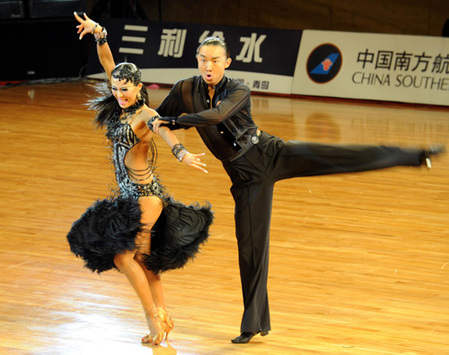第一次登上亞運會舞臺的非奧項目體育舞蹈昨日傍晚結束比賽,新產生的5枚金牌全被中國隊包攬。連同之前一天獲得的好成績,中國體育舞蹈隊派上場的6隊選手包攬該項目10枚金牌。王為/陳金獲得拉丁舞桑巴和斗牛2塊金牌;石磊/張白羽繼前一天的拉丁5項舞金牌后,昨日再次在拉丁舞恰恰恰上奪金,楊超/譚軼凌也延續了前一日的成功,在標準5項舞里獲得金牌;范文博/陳世瑤則在牛仔舞中摘金。

 |
|
China's Wang Wei and Chen Jin compete in the Latin-Samba of DanceSport at the 16th Asian Games in Guangzhou on Nov 14, 2010. They won the gold medal. (Xinhua)
|
China's dancers shimmied their way to a clean sweep of 10 gold medals on Sunday as the discipline made its Asian Games debut.
Wearing tight pants and sequined gowns, the Chinese participants whipped up local crowds to a frenzy with sizzling victories in a range of styles including the waltz, tango, foxtrot, Latin Jive, samba and Cha-cha-cha.
"I never thought we would get 10 gold medals with South Korea and Japan being so strong," said Shi Lei who snared two golds in the Latin Cha-cha-cha and Latin five dances.
There are now an estimated 30 million enthusiasts who take part in dance sports across China. On many levels, including movement, body lines, rhythmic interpretation and footwork, the Chinese shone brightest.
"This defines China's (dance) status in Asia and the international arena," said Chen Shiyao who won gold in Latin Jive. "There will be more professional as well as amateur dancers from now on."
Japan, where ballroom dancing is wildly popular, had been expected to win a brace of medals but brother and sister team Rara and Yumiya Kubota had to settle for silver in the Latin fives and bronze in the Latin Jive.
Among the gold medallists was Wu Zhi’an in the slow foxtrot who was made to dance when he was seven years old to help his asthma and was sent by his parents to England to develop his passion.
"Every class costs 2,000 yuan, my husband and I had to scrimp and save to send my son to the UK," said Deng Hongni, his mother, in an interview with a Chinese newspaper.
相關閱讀
廣州亞運會對嗚嗚祖拉說不
第16屆亞運會青年營隆重開營
(Agencies)

Vocabulary:
foxtrot: 狐步舞
Latin Jive: 拉丁牛仔舞
(中國日報網英語點津 Helen 編輯)